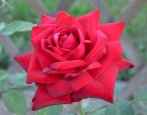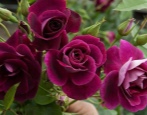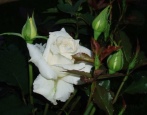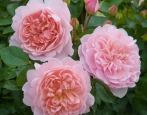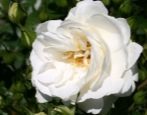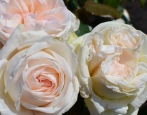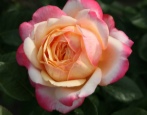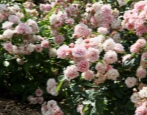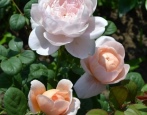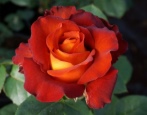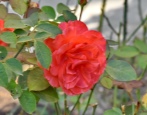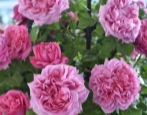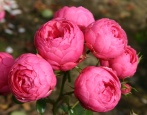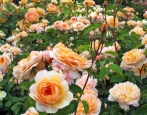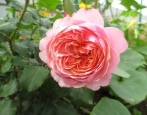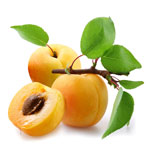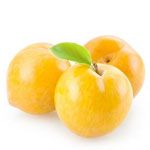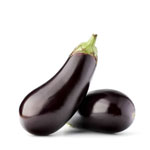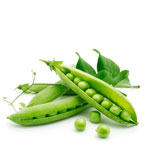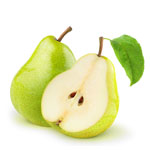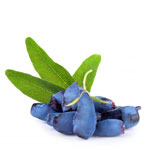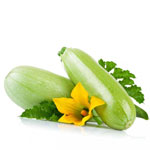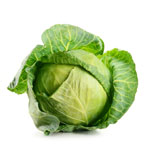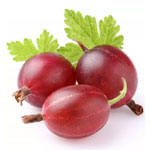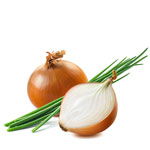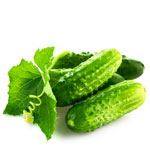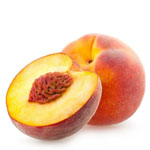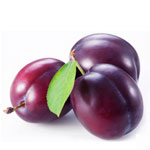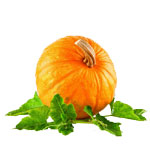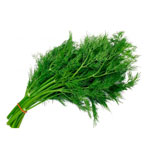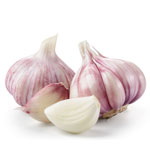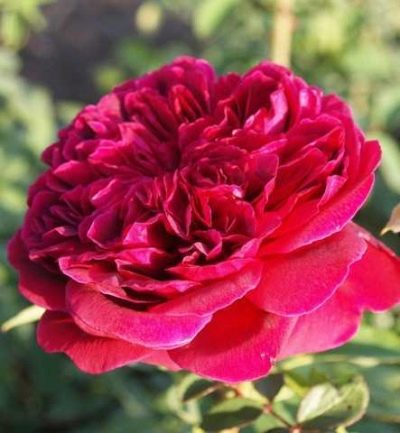
- Authors: Meilland
- Name synonyms: Alain Souchon
- Breeding year: 2005
- Group: tea-hybrid
- The main color of the flower: red
- Flower shape: flat-bowl
- Flower size: large
- Diameter, cm: 12-13
- Flower type by number of petals: thick double
- Scent: pink with notes of anise, raspberry, strawberry
Alain Souchon hybrid tea rose is considered one of the best options for decorating a garden or greenhouse. Large buds look excellent when cut, blooming, producing lush flowers with expressive and bright color of the petals. This hybrid tolerates drought well. The variety is also known in Europe under the names Rouge Royal, Caruso, Valentina Casucci, and has received several international awards for its aroma.
Breeding history of the variety
The rose was bred in 2005 in France, in Meilland nursery. It got its name in honor of the famous singer and composer in Europe. The breeding work was carried out by Jacquez Mouchotte. When crossed, the roses Ambassador and Fiorella were used.
Description of the variety
The bushes of this variety are compact, 90-100 cm high and 60 cm wide. The leaves on the plant are dark green, medium-sized, semi-glossy. 1 flower is formed on the stem. The shoots are strong and sturdy, do not require binding or support, are arranged vertically.
The buds are colored in a dark red tone, the flowers are lighter, but always bright. There are no signs of two-color or variegation. The bud is rounded, the corolla is flat-capped. The flowers are large, 12-13 cm in diameter, densely double, each with 100 petals. The aroma of this variety is very strong, pink, slightly spicy, with notes of anise, raspberry and strawberry.
Advantages and disadvantages
The Alan Souchon variety is a magnificent embodiment of the Romantic tea variety. Its obvious advantages include:
spectacular flower shape;
pronounced terry;
color variations from blood red to cherry and purple;
tightness of the petals;
the sophistication of a scent that has won recognition in Tokyo and Buenos Aires;
high quality of planting material;
the strength of the stems;
abundant flowering;
graceful small bushes that do not require much space.
The disadvantages of the variety include the untidiness of the appearance of the petals, which manifests itself after the rain. And also he does not tolerate exposure to direct sunlight. The decorativeness of the plant can be greatly affected by this.
Flowering features
The Alan Souchon variety blooms throughout the season, until late autumn, continuously and very abundantly. Each bud remains decorative for up to 2 weeks.
Use in landscape design
In addition to being used for cutting, the Alan Souchon rose is great for garden decoration. It is planted as a tapeworm or as part of mixborders, as a bush or standard form.
Growing regions
The variety is aimed at growing in temperate climates. It is successfully cultivated in central Russia. In regions with winter temperatures below -23 degrees, planting is recommended only in greenhouses.
Landing
Plants are recommended to be placed in the sun or partial shade. The soil is suitable for fertile, breathable, light. Planting is recommended in autumn or spring, in April-May. There should be no more than 4 bushes per 1 m2. The optimal distance between them is 40-50 cm.
The planting of the bush is carried out in a hole about 60 cm deep. Its bottom is lined with a crushed stone pillow about 10 cm high.Then a nutrient layer of organic fertilizers is laid, and on top is a garden soil in which the rose is planted.Young shoots are pretreated with a growth stimulant.
When planting, the root collar is buried below ground level. The soil around the stem is compacted. Then spill well with water, spread the mulch on top.
Growing and care
Alan Souchon's roses require some attention from the gardener. Formation of powerful and strong bushes is possible only by regulating flowering. In 1 year after planting, extra buds must be removed. It is important to ensure that neighboring tall plants do not form an unnecessarily thick shade, otherwise the development of roses will be slowed down. Plants will benefit from periodic weeding and loosening.
Watering and feeding
Plants are drought-resistant, not afraid of extreme heat, some flowers are damaged by rain. Watering is carried out with warm settled water. The standard water consumption is 15-20 liters per bush. In dry and hot periods, watering is carried out up to 2 times a week. Top dressing is required minimal, in the spring with nitrogen, in the summer with phosphorus and potassium to stimulate budding.
Pruning
Bushes need formative and sanitary pruning on a regular basis. In the spring, the tops of the shoots are removed, leaving up to 3 buds on each. In the summer, wilted buds are removed from the branches in a timely manner. In autumn, overgrown branches are thinned out. Damaged shoots, sick and weakened, are also cut out.
Frost resistance and preparation for winter
According to the USDA classification, the Alan Souchon variety is referred to the 6th zone of frost resistance. Bushes successfully overwinter under the snow if properly prepared with the construction of a shelter. After autumn leaf fall, the bush is sprinkled with sand. Then they are tied with spruce branches.
Diseases and pests
This variety of roses has a high resistance to the main complex of crop diseases. To a mild degree, it can be affected by fungal diseases. Medium resistance to powdery mildew and black spot. Mites and beetles, caterpillars, aphids can appear on the bushes. They are fought with chemical insecticides.
When planting roses next to a juniper, there is a high risk of rust damage. And also the variety can be affected by a sooty fungus. Its spores cover the plants with a solid black bloom. Spraying with a soap-alcohol solution will help to eliminate the problem.
Review overview
Rose Alan Souchon belongs to those hybrid tea varieties that delight connoisseurs of the classic form of this flower. They look a little old-fashioned due to the lodged rim. But everything is compensated by the purity and brightness of the color of the petals in combination with a wonderful aroma. In it, gardeners notice shades of fruits and spices, merging into a unique, very persistent composition. Many people point to the oiliness of the scent.
The ability of the bush to overwinter is also assessed as high. It is mentioned that foliage grows quickly on these roses. The constant formation of buds allows you to enjoy the flowering of the bush all summer long.
There are also negative reviews. Not all gardeners like the shape of a bush with straight shoots. The abundance of foliage somewhat reduces the decorative effect of the buds, makes it difficult to admire them. It is also mentioned that the variety is not suitable for regions with high rainfall.

